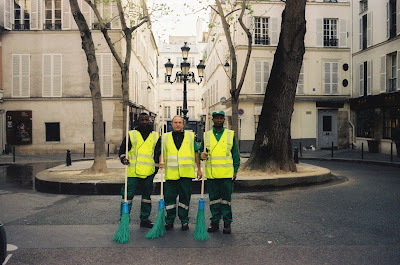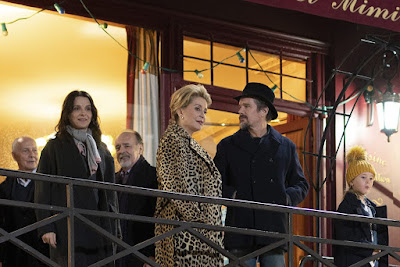A calligram, according to Wikipedia, is text arranged in such a way that it forms a thematically related image. TrustMovies is not sure he actually saw a calligram in any of the many works of artist/filmmaker Ulrike Ottinger on display in her new documentary, PARIS CALLIGRAMMES.
But perhaps she means her film itself to be a kind of calligram, with her voiced text acting in coordination with the often quite wonderful visuals she presents of the city of Paris that existed when Ottinger first came to live there during the transitional/tumultuous 1960s. Upon finishing this over-two-hour-long film, I was initially struck by the fact that I'd very much enjoyed the whole experience, even though I didn't much care for the snippets of her own films that Ottinger -- shown above on the poster as a young woman and at left in current times (yes, she likes sunglasses) -- includes throughout.
Yet the beauty, charm and intelligence of this documentary comes through via Ottinger's unusual combination of nostalgia for a lost time and place, and her adamant stance regarding art, artists and in particular those famous student demonstrations of the late 1960s (she seems wisely anti the violent police behavior, as well as some of the students' stupid and sleazy shenanigans).
Ottinger seems particularly taken with (as so many of us were) the work and career of wife/husband acting/producing team of Madeleine Renaud and Jean-Louis Barrault (Remorques, Les enfants du paradis, etc. ), as well as by so many of the artists of that day (and much earlier, too). The filmmaker has a keen sense of history, particularly regarding French colonialism, and the documentary is simultaneously a love letter to the enchantments of Paris and a hard, repeated slap in the face to France itself.
The filmmaker's interests are wide-ranging, even if, of course, they come back again and again to art and cinema. Yet we spend as much time at the gorgeous, horrific Colonial Museum, as at the Cinémathèque Française, and we move from Algeria as the topic of both art and conversation to Vietnam.
Particularly interesting is how Ottinger weaves modern-day views with footage of Paris in the 60s; there's a wonderful scene in and around a hair salon for blacks that seems to span three generations. Another section details Fritz Picard and an antiquarian bookstore. In her views on how to convert experience into art, Ottinger is both generous and buoyant.
Among the examples of her art, my favorite is one of Allen Ginsberg cut into puzzle pieces. Ottinger tells us that, at its debut, she disassembled all the pieces, tossed them into air, and let the audience put them together again. Ballsy chick!
Even if you've never been to Paris but only seen and heard of its wonders secondhand, I suspect Paris Calligrammes will interest, amuse and bemuse you in equal measure. From Icarus Films, running 131 minutes, and featuring a very fine English narration from the beautifully husky-voiced Jenny Agutter, the documentary opens this Friday, April 23, in New York City at Film Forum on virtual cinema and then, April 30, will have a limited engagement at theaters nationwide. To view all scheduled theater screenings, click here and then scroll down to the "P" section.
Her colorful, humorous visual art itself is often fun, usually interesting and sometimes provocative. And one would have to have seen her films in their entirety to make any truly informed judgment.
Yet the beauty, charm and intelligence of this documentary comes through via Ottinger's unusual combination of nostalgia for a lost time and place, and her adamant stance regarding art, artists and in particular those famous student demonstrations of the late 1960s (she seems wisely anti the violent police behavior, as well as some of the students' stupid and sleazy shenanigans).
Ottinger seems particularly taken with (as so many of us were) the work and career of wife/husband acting/producing team of Madeleine Renaud and Jean-Louis Barrault (Remorques, Les enfants du paradis, etc. ), as well as by so many of the artists of that day (and much earlier, too). The filmmaker has a keen sense of history, particularly regarding French colonialism, and the documentary is simultaneously a love letter to the enchantments of Paris and a hard, repeated slap in the face to France itself.
The filmmaker's interests are wide-ranging, even if, of course, they come back again and again to art and cinema. Yet we spend as much time at the gorgeous, horrific Colonial Museum, as at the Cinémathèque Française, and we move from Algeria as the topic of both art and conversation to Vietnam.
Particularly interesting is how Ottinger weaves modern-day views with footage of Paris in the 60s; there's a wonderful scene in and around a hair salon for blacks that seems to span three generations. Another section details Fritz Picard and an antiquarian bookstore. In her views on how to convert experience into art, Ottinger is both generous and buoyant.
Among the examples of her art, my favorite is one of Allen Ginsberg cut into puzzle pieces. Ottinger tells us that, at its debut, she disassembled all the pieces, tossed them into air, and let the audience put them together again. Ballsy chick!
Even if you've never been to Paris but only seen and heard of its wonders secondhand, I suspect Paris Calligrammes will interest, amuse and bemuse you in equal measure. From Icarus Films, running 131 minutes, and featuring a very fine English narration from the beautifully husky-voiced Jenny Agutter, the documentary opens this Friday, April 23, in New York City at Film Forum on virtual cinema and then, April 30, will have a limited engagement at theaters nationwide. To view all scheduled theater screenings, click here and then scroll down to the "P" section.





























































